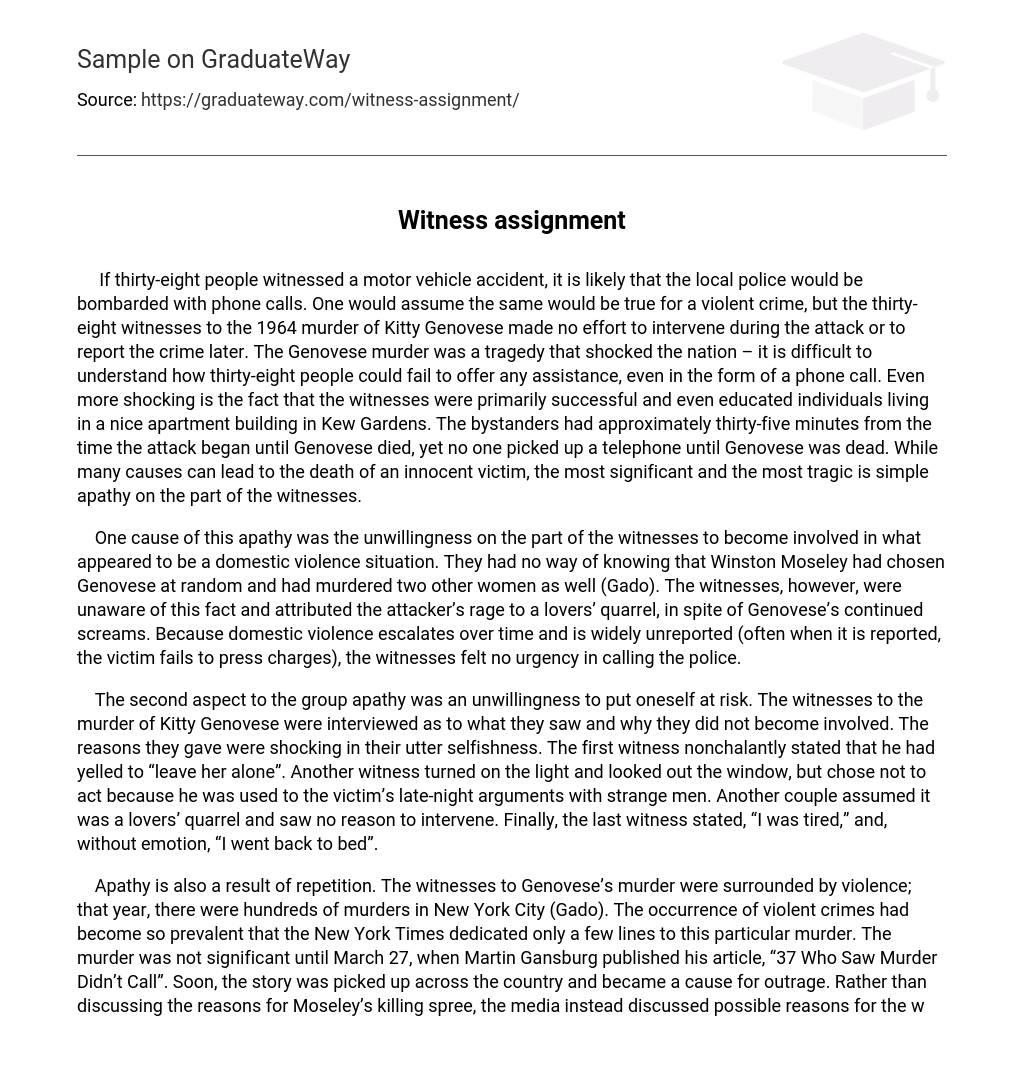If thirty-eight people witnessed a motor vehicle accident, it is likely that the local police would be bombarded with phone calls. One would assume the same would be true for a violent crime, but the thirty-eight witnesses to the 1964 murder of Kitty Genovese made no effort to intervene during the attack or to report the crime later. The Genovese murder was a tragedy that shocked the nation – it is difficult to understand how thirty-eight people could fail to offer any assistance, even in the form of a phone call. Even more shocking is the fact that the witnesses were primarily successful and even educated individuals living in a nice apartment building in Kew Gardens. The bystanders had approximately thirty-five minutes from the time the attack began until Genovese died, yet no one picked up a telephone until Genovese was dead. While many causes can lead to the death of an innocent victim, the most significant and the most tragic is simple apathy on the part of the witnesses.
One cause of this apathy was the unwillingness on the part of the witnesses to become involved in what appeared to be a domestic violence situation. They had no way of knowing that Winston Moseley had chosen Genovese at random and had murdered two other women as well (Gado). The witnesses, however, were unaware of this fact and attributed the attacker’s rage to a lovers’ quarrel, in spite of Genovese’s continued screams. Because domestic violence escalates over time and is widely unreported (often when it is reported, the victim fails to press charges), the witnesses felt no urgency in calling the police.
The second aspect to the group apathy was an unwillingness to put oneself at risk. The witnesses to the murder of Kitty Genovese were interviewed as to what they saw and why they did not become involved. The reasons they gave were shocking in their utter selfishness. The first witness nonchalantly stated that he had yelled to “leave her alone”. Another witness turned on the light and looked out the window, but chose not to act because he was used to the victim’s late-night arguments with strange men. Another couple assumed it was a lovers’ quarrel and saw no reason to intervene. Finally, the last witness stated, “I was tired,” and, without emotion, “I went back to bed”.
Apathy is also a result of repetition. The witnesses to Genovese’s murder were surrounded by violence; that year, there were hundreds of murders in New York City (Gado). The occurrence of violent crimes had become so prevalent that the New York Times dedicated only a few lines to this particular murder. The murder was not significant until March 27, when Martin Gansburg published his article, “37 Who Saw Murder Didn’t Call”. Soon, the story was picked up across the country and became a cause for outrage. Rather than discussing the reasons for Moseley’s killing spree, the media instead discussed possible reasons for the witnesses’ apathy, including the introduction of television into the mainstream. They all agreed that the failure to take action as the crime occurred was inexcusable. Some residents of Kew Gardens, however, had other concerns. ““These things happen every day all over the world,” one neighbor told a reporter, “The stories were only giving us a black eye!”” (Gado).
In conclusion, the main reason for the death of Catherine “Kitty” Genovese was apathy on the part of the thirty-eight witnesses. If even one person had called the police when the attack began, Kitty would have survived. Indeed, it took the police two minutes to arrive on the scene once they had been called. Today, the name Genovese is sadly connected with the concept of apathy and the needless death of a young woman.
Works Cited:
Gado, Mark. “All About The Kitty Genovese Murder.” Crime Library. 2007. Court Television. 13 Apr 2007 <http://www.crimelibrary.com/serial_killers/predators/kitty_genovese/>.





